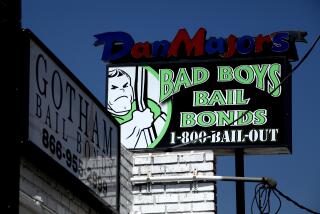Court Must Justify Sending Drivers to AA
- Share via
El Cajon Municipal Court judges must have more justification than the presence of a 0.20% blood-alcohol level before they require accused drunk drivers to attend Alcoholics Anonymous meetings as a condition of release from jail, a Superior Court judge ruled Friday.
The ruling by Judge Richard D. Huffman affected two defendants who contested the requirement that they attend Alcoholics Anonymous meetings. The judge also said that, in the future, El Cajon Municipal Court judges will have to document how attendance at the AA meetings will help accused, but not convicted, drunk drivers to make their court appearances.
“Basically, this puts the burden on the Municipal Court to establish that drivers with a 0.20 blood-level are more drunk, they are unreliable and won’t show up in court,” said Les Dubow, a San Diego County deputy district attorney.
Documenting the need for attending AA meetings could include expert testimony and evidence of prior drunk driving arrests, Dubow said.
Arelene Prater, deputy county counsel who represented the El Cajon Municipal Court judges, said she had informed the judges of the ruling but that no decision has been made about what to do next. “They have to make a record of the facts” if they want to continue the AA meeting requirement, she said.
It’s likely, she added, that the judges, along with her and Dubow, will meet next week to decide on “an outline on how to proceed.”
El Cajon attorney Tom Adler, who opposed the AA meeting requirement and represented the two defendants at Friday’s two-hour hearing, said Huffman’s ruling “puts the onus on the court to justify it.”
“I don’t think there can be a justification,” he said. “They can either abandon the policy or, I assume, have some kind of hearing on how they will attempt to do the justifying.”
In contesting the AA requirement as a condition of winning pretrial release from jail on a defendant’s own recognizance, the defense lawyers contend that state law entitles defendants to such release unless the person is a danger to the community or is unlikely to appear at his court hearing.
By requiring attendance at AA meetings as a condition of release, the lawyers say the judges are violating the Constitution by, in effect, declaring suspects guilty before they have had a trial.
The judges have defended their policy by arguing that a sober defendant is less likely to skip court or to commit more offenses while he is awaiting the outcome of his case.
Though policies vary from judge to judge and case to case, the general practice of East County judges is to require AA attendance for three categories of drunk driving defendants: drivers whose blood alcohol level is 0.20% or higher, repeat drunk drivers and defendants who refuse to take a field sobriety test.
More than 60 defendants each month in El Cajon have been ordered to attend the AA meetings, according to lawyers who practice in the Municipal Court. Judges in the other three county Municipal Courts--in San Diego, Chula Vista and Vista--do not require AA attendance as a condition of release.
Adler had asked Huffman to make his finding apply to all accused drunk drivers in the El Cajon court as a class. But Huffman denied that request, instead specifically invalidating the AA requirement for the two defendants, Felipe Garcia Loyo and Kerri Mainville, who contested the policy.
“Any condition imposed on O.R. (own recognizance) release must be reasonably related to and attempt to assure subsequent court appearances,” Huffman said in his one-page ruling. “The record of the . . . El Cajon Judicial District is totally devoid of any factor other than the blood-alcohol level. . . in determining that these (defendants) are less inclined to attend subsequent court appearances and/or are alcoholics.
“The court finds the record fails to demonstrate that a blood alcohol level of 0.20 or above is reasonably related to reliability and alcoholism. Thus, the O.R. release condition of attendance at Alcoholics Anonymous imposed on these (defendants) is invalid.”
Huffman’s ruling also said that the El Cajon Municipal Court had failed to show how attendance at AA meetings helps defendants show up at their court hearings.
More to Read
Sign up for Essential California
The most important California stories and recommendations in your inbox every morning.
You may occasionally receive promotional content from the Los Angeles Times.













